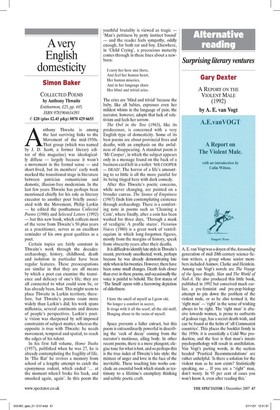Avery English domesticity
Simon Baker COLLECTED POEMS by Anthony Thwaite Enithamion, £25, pp. 445, ISBN 9781904634393 £20 (plus £2.45 p&p) 0870 429 6655 Anthony Thwaite is among the last surviving links to the Movement of the mid-1950s. That group (which was named by J. D. Scott, a former literary editor of this magazine) was ideologically diffuse — largely because it wasn't a movement in the formal sense — and short-lived, but its members' early work marked the transitional stage in literature between patrician romanticism and demotic, illusion-free modernism. In the last few years Thwaite has perhaps been mentioned chiefly for his role as literary executor to another poet briefly associated with the Movement, Philip Larkin — he edited the posthumous Collected Poems (1988) and Selected Letters (1992) — but this new book, which collects most of the verse from Thwaite's 50-plus years as a practitioner, serves as an excellent reminder of his own great qualities as a poet.
Certain topics are fairly constant in Thwaite's work through the decades: archaeology, history, childhood, death and isolation in particular have been regular features. These preoccupations are similar in that they are all means by which a poet can examine the transience and delicacy of one's life; they are all connected to what could soon be, or has already been, lost. This might seem to place Thwaite in Larkin territory, therefore, but Thwaite's poems roam more widely than Larkin's did; his work spans millennia, several continents and dozens of people's perspectives. Larkin's poetic vision was sharpened by self-imposed constraints of subject-matter, whereas the opposite is true with Thwaite: he needs movement, temporal and spatial, to reach the edges of his talent.
In his first full volume, Home Truths (1957), published when he was 27, he is already contemplating the fragility of life. In 'The Rat' he revives a memory from school of a lengthy attempt to catch the eponymous rodent, which ended ' ... at the moment when/I broke his back, and smashed again, again'. In this poem the youthful brutality is viewed as tragic — `Man's pettiness by petty instinct bound' — and the reader feels sympathy, oddly enough, for both rat and boy. Elsewhere, in 'Child Crying', a precocious maturity comes through in these lines about a newborn: I carry her here and there, And feel her human heart, Her human miseries, And in her language share Her blind and trivial cries.
The cries are 'blind and trivial' because the baby, like all babies, expresses even her mildest whims in the language of pain; the narrator, however, adopts that lack of relativism and feels her sorrow.
The Owl in the Tree (1963), like its predecessor, is concerned with a very English type of domesticity. Some of its best poems are about provincial lives and deaths, with an emphasis on the awfulness of disappearing. A standout poem is 'Mr Cooper', in which the subject appears only in a message found on the back of a business card left in a toilet: 'MR COOPER — DEAD'. The horror of a life's amounting to so little is all the more painful for its being tinged here with dark comedy.
After this Thwaite's poetic concerns, while never changing, are painted on a broader canvas. The Stones of Emptiness (1967) finds him contemplating existence through archaeology. There is a comforting note in poems such as 'Cleaning a Coin', where finally, after a coin has been washed for three days, 'Through a mask of verdigris/ A profile stares'. Victorian Voices (1980) is a great work of ventriloquism in which long-forgotten figures, mostly from the margins of history, speak from obscurity years after their deaths.
It is difficult to identify late style in Thwaite's recent, previously uncollected, work, perhaps because he was already demonstrating late style when in his twenties. However, there have been some small changes. Death feels closer than ever in these poems, and occasionally the voice is painful to behold. The first stanza of 'The Smell' opens with a harrowing depiction of elderliness: I hate the smell of myself as I grow old. No longer a comfort in secret, It drags with it all the scurf, all the old stuff, Hanging about in the ruins of myself.
Space prevents a fuller extract, but this poem is extraordinarily powerful in describing the 'reek of decay' coming from the narrator's mutinous, ailing body. In other recent poems, there is a more plangent, elegiac tone for what is lost, and so perhaps this is the true index of Thwaite's late style: the mixture of anger and love in the face of the inevitable. These touching late works conclude an essential book which stands as testimony to a lifetime's exemplary thinking and subtle poetic craft.





































































 Previous page
Previous page